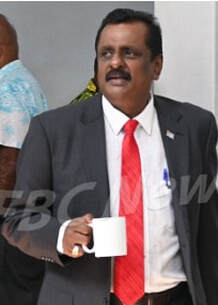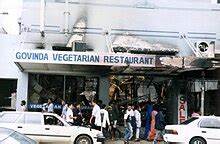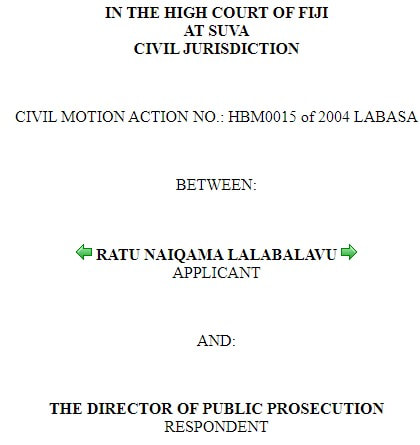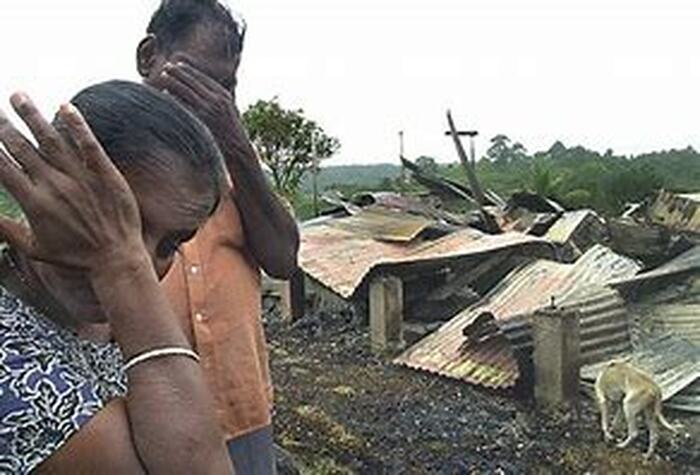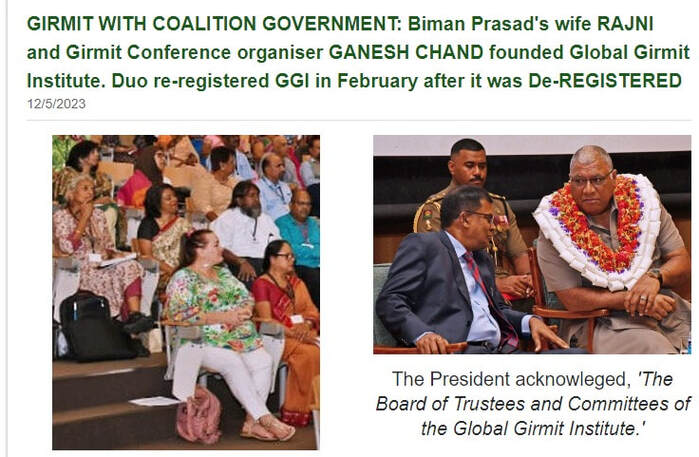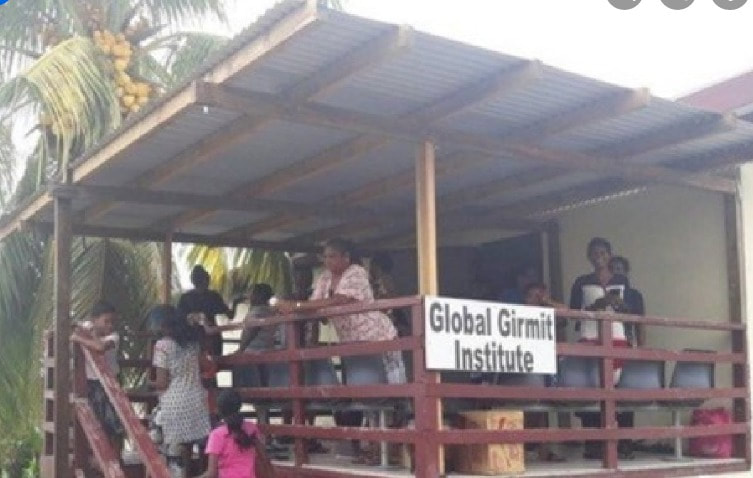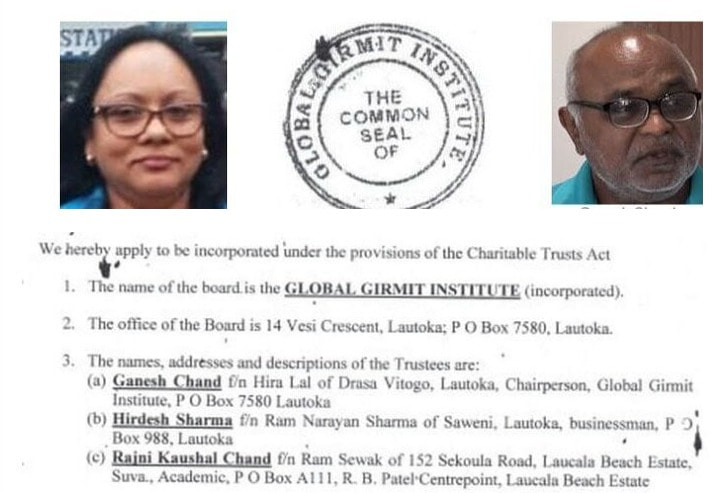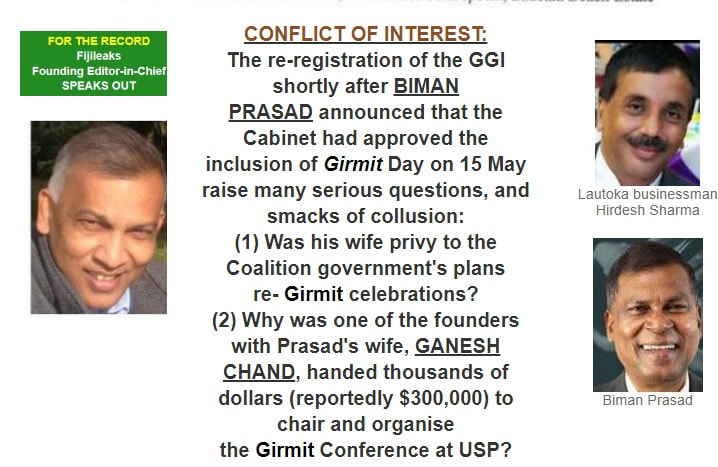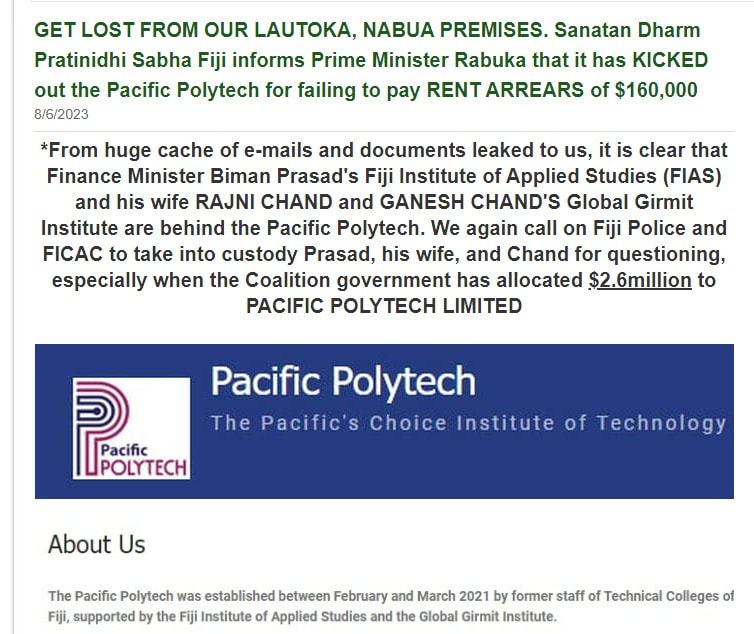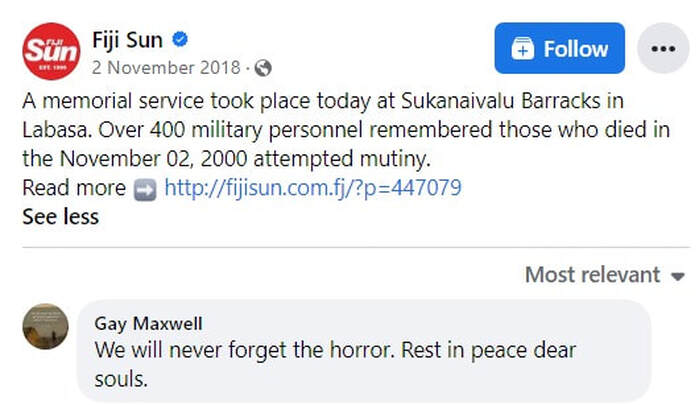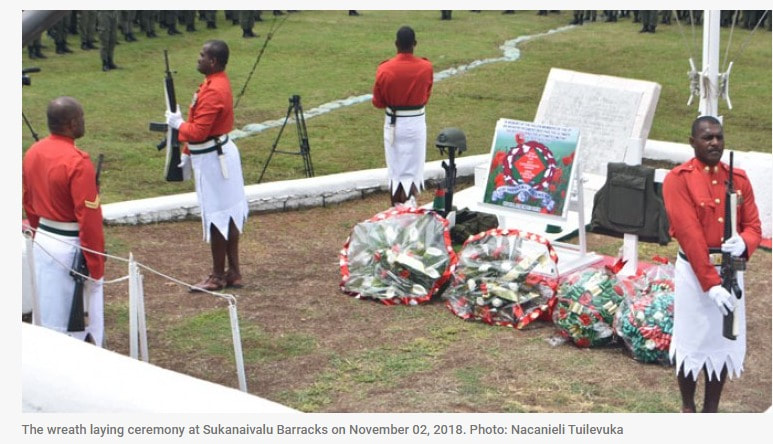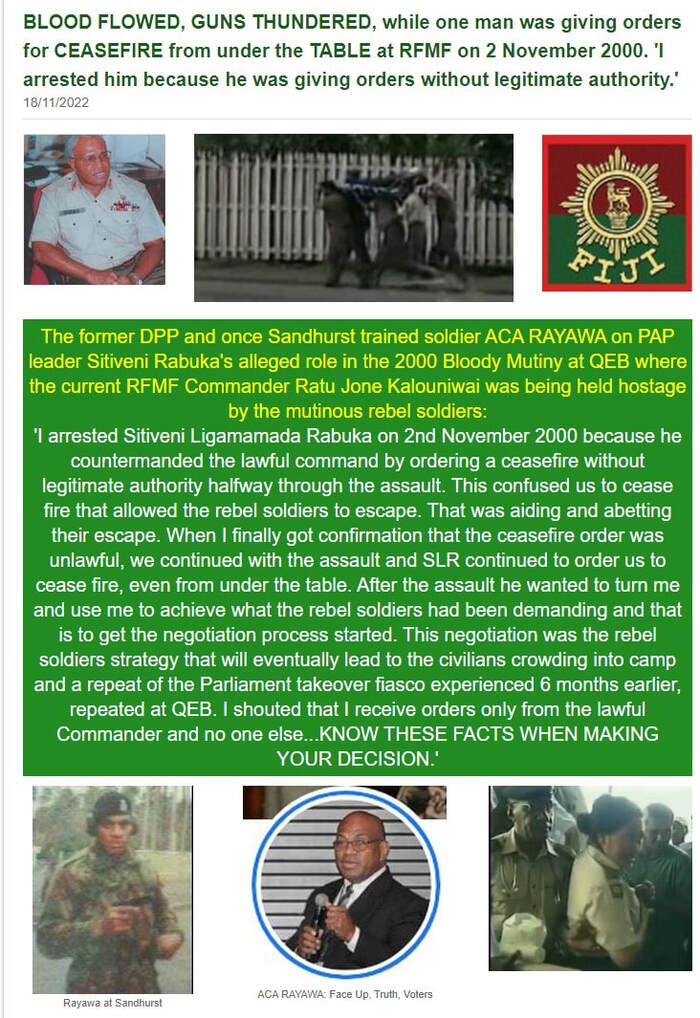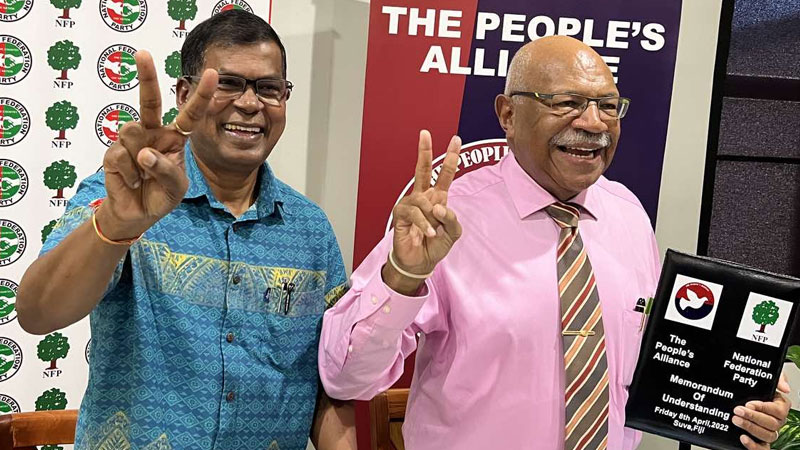Fijileaks: Come on, Biman Prasad. You are calling on the SPEAKER to reprimand BALA for allegedly inciting racial hatred. Where were you when PAP appointed a failed candidate with 300 votes, Ratu Naiqama Lalabalavu, as Speaker, a paramount high chief who was jailed for joining GEORGE SPEIGHT in the worst racial violence against Indo-Fijians, especially women and girls who were beaten and raped in their own homes. Lalabalavu was controversially released from prison regarding his involvement at Sukunaivalu military barracks in Labasa.
*Bala also accused you of doling out over $1million to Ganesh Chand's shady Pacific Polytechnic which has close links to your WIFE, and another FFP MP questioned you over $200,000 to Global Girmit Institute
| The Parliament Secretary has taken note of a Standing Order against Opposition MP Praveen Bala. This after Deputy Prime Minister and Minister for Finance Professor Biman Prasad moved that Bala is using parliament to incite racial hatred. Bala, in his response to the national budget, says the new scholarship system that replaces the Tertiary Education Loans Scheme is a badly thought-out election promise. |
The Opposition MP says the Finance Minister is simply keeping his job by keeping his promise.
“In fact, he knows very well that a scheme such as TELS is the only way to have a system that has the most accessible means to higher education for all the people of Fiji. Its replacement is a system that many suffered under, and he would know of the discrimination faced on racial grounds, as he was a student in the 1980s and 1990s.”
Finance Minister Professor Biman Prasad immediately raised a point of order, claiming that Bala is inciting racial hatred.
“The honorable member is fanning racial hatred by lying, because this is what they did before the election; they said there would be a race-based scholarship under Standing Order 62. This man, who has just lied before, is now using Parliament to incite racial hatred. That’s what he’s done.”
Prasad says nowhere in the budget does it say any of those programs will be based on race.
The Finance Minister says this needs to be dealt with. Speaker Ratu Naiqama Lalabalavu then asked the Parliament Secretary to take note of the point of order, saying this was the second time.
“In fact, he knows very well that a scheme such as TELS is the only way to have a system that has the most accessible means to higher education for all the people of Fiji. Its replacement is a system that many suffered under, and he would know of the discrimination faced on racial grounds, as he was a student in the 1980s and 1990s.”
Finance Minister Professor Biman Prasad immediately raised a point of order, claiming that Bala is inciting racial hatred.
“The honorable member is fanning racial hatred by lying, because this is what they did before the election; they said there would be a race-based scholarship under Standing Order 62. This man, who has just lied before, is now using Parliament to incite racial hatred. That’s what he’s done.”
Prasad says nowhere in the budget does it say any of those programs will be based on race.
The Finance Minister says this needs to be dealt with. Speaker Ratu Naiqama Lalabalavu then asked the Parliament Secretary to take note of the point of order, saying this was the second time.
"One aspect of this case which is cause for disquiet is the way this application came to be made. First, as I have said a similar application was made in the Magistrate courts on the day trial was to commence. Obviously the Magistrate had no jurisdiction to hear a constitutional redress issue. The applicant again went to rest and six days before the defence was to open its case, in the Magistrates Court he filed this application. He had all the time after 31st August 2004 to file this application but filed it during the legal vacation."
Justice Jiten Singh, 8 April 2005
Mr. K. Vuataki for the Applicant
Mr. W. Kuruisaqila for the Respondent
JUDGMENT
The application before me is made pursuant to Section 41 of the 1997 Constitution and the High Court (Constitutional Redress) Rules 1998. The motion seeks a declaration that the applicant’s Constitutional right to a trial within reasonable time and right to fair trial under Section 29 of the Constitution was breached. He is seeking an order permanently staying further proceedings by the Magistrate’s Court of Criminal Case in State v. Ratu Naiqama Lalabalavu - Criminal Action 172 of 2004 at Labasa Magistrate’s Court.
The applicant filed three affidavits:
(a) first sworn on 30th November 2004
(b) supplementary affidavit sworn on 24th January 2005
(c) supplementary affidavit sworn on 11th February 2005.
The applicant was initially charged with two others for the offence of unlawful assembly. The events are alleged to have occurred between 4th July 2000 and 3rd August 2000at Sukanaivalu Barracks in Labasa. The charges were filed on 8th November 2000.
The chronology of events since filing of charge is as follows:
I have had both written and oral submissions from counsels. If I may say part of respondent’s written submissions dealt with stay on grounds of abuse of process. That is not the ground on which the applicant is proceeding. Abuse of process is not alleged.
Mr. Vuataki relied heavily on the case of Apaitia Seru & Anthony Frederick Stevens v. the State – Criminal Appeals AAU0041 and 42 of 1991, where the Court of Appeal considered what is the applicable law in Fiji in case of delay. It adopted the principles on delay as considered in Martin v. Tauranga District Court – [1995] 2 NZLR 419.
At page 9 of the judgment the Court of Appeal laid out what ought to be the approach of courts and what factors to consider in applications for stay on grounds of delay.
“The general approach to a determination as to whether the right has been denied is not by the application of a mathematical or administrative formula but rather by a judicial determination balancing the interests which the section is designed to protect against factors which either inevitably lead to delay or are otherwise the cause of delay. As I noted in Smith [ R v Smith (1989) 52 CCC (3d) 97], ‘(i)t is axiomatic that some delay is inevitable. The question is, at what point does the delay become unreasonable?’ .... While the court has at times indicated otherwise, it is now accepted that the factors to be considered in analyzing how long is too long may be listed as follows:
1. the length of the delay;
2. waiver of time periods;
3. the reasons for the delay, including
(a) inherent time requirements of the case;
(b) actions of the accused;
(c) actions of the Crown;
(d) limits on institutional resources, and
(e) other reasons for delay, and
4. prejudice to the accused. (12-13)”
In Attorney-General’s Reference No. 1 of 1990 [1992] 3 ALL ER 169 Lord Lane at page 176 cautioned against permanent stays being granted too readily. He stated that:
“Stays imposed on the grounds of delay or for any other reason should only be employed in exceptional circumstances. If they were to become a matter of routine, it would only be a short time before the public, understandably, viewed the process with suspicion and mistrust. We respectfully adopt the reasoning of Brennan J in Jago v. District Court of New South Wales [1989] HCA 46; (1989) 168 CLR 23.
In principle, therefore, even where the delay can be said to be unjustifiable, the imposition of a permanent stay should be the exception rather than the rule. Still more rare should be cases where a stay can properly be imposed in the absence of any fault on the part of the complainant or prosecution. Delay due merely to the complexity of the case or contributed to by the actions of the defendant himself should never be the foundation for a stay.”
With those above remarks I shall now consider various relevant factors:
The applicant deposes that he was called to Sukanaivalu Barracks by Tui Labasa who died on 11th February 2002. He also deposed that one Ratu Orisi Vuki had been sent by Tui Labasa to call the applicant to the barracks and Ratu Orisi Vuki died on 23rd June 2003.
When questioned if the defence had statements from these various deceased witnesses, Mr. Vuataki admitted they had not taken statements from them. Without the statements, the court is left to speculate as to the nature of the evidence and its relevance to the defence. In paragraph 9 of his supplementary affidavit, sworn on 11th February 2005 the applicant deposes that a number of Army officers had also visited him. The applicant could have subpoenaed any of these officers if he considered their evidence relevant. The applicant must show that the evidence of the alleged deceased witnesses would be relevant as to disputed material facts in issue.
The applicant also deposed that he was prejudiced in that the original statements of all witnesses were not disclosed but only typed statements of witnesses were provided. The normal practice in Fiji is for police to hand-write the statements of witnesses. Often the handwriting is impossible to read so typed statements are given. If the counsel had difficulty getting a witness to admit a statement was his, the counsel could easily have made an application to the learned magistrate to ask prosecution to show the original statement to the witness. The original hand-written statements are not released to the defence but only photocopies or typed version. If the counsel failed in presentation of the case, that cannot be made a ground for stay.
Mr. Vuataki also submitted that his client was a public figure. He is the Minister for Lands, Leader of political party and a traditional leader and therefore occupied prominent position. He submitted that this was a high profile case with lot of media attention. He relied on authority of Apaitia Seru where at page 13 the Court of Appeal stated “to have serious, high profile charges handing over ones head for more than four years, with the ultimate spectre of a possible prison sentence, is in itself prejudicial”. He said in such a case there was no need to show prejudice.
The activities of those who occupy prominent position in society generally attract attention of the media. That is inevitable part of such occupations. I also do not lose sight of the fact that the maximum penalty for the offence is one year.
In Apaitia Seru the delay was institutional delay principally in the courts – both by the Magistrates Court during committal proceedings and later in the High Court.
One aspect of this case which is cause for disquiet is the way this application came to be made. First, as I have said a similar application was made in the Magistrate courts on the day trial was to commence. Obviously the Magistrate had no jurisdiction to hear a constitutional redress issue. The applicant again went to rest and six days before the defence was to open its case, in the Magistrates Court he filed this application. He had all the time after 31st August 2004 to file this application but filed it during the legal vacation.
At the time of the hearing of this application, the trial was well and truly over with only the judgment of the court left to be delivered on 4th April 2005. One would expect such applications to be made well ahead of the commencement of the hearing proper of the criminal trial so the outcome is known before the hearing date.
The delay in this case has to be seen in its proper context. There are lengthy delays as a result of applicant wishing to make representations to the DPP, lengthy delays due to absence of one or other accused. This is not a proper case where a permanent stay is warranted. The application is accordingly dismissed with costs which I summarily fix in the sum of $300.00.
[ Jiten Singh ]
JUDGE
At Suva
8th April 2005
Mr. W. Kuruisaqila for the Respondent
JUDGMENT
The application before me is made pursuant to Section 41 of the 1997 Constitution and the High Court (Constitutional Redress) Rules 1998. The motion seeks a declaration that the applicant’s Constitutional right to a trial within reasonable time and right to fair trial under Section 29 of the Constitution was breached. He is seeking an order permanently staying further proceedings by the Magistrate’s Court of Criminal Case in State v. Ratu Naiqama Lalabalavu - Criminal Action 172 of 2004 at Labasa Magistrate’s Court.
The applicant filed three affidavits:
(a) first sworn on 30th November 2004
(b) supplementary affidavit sworn on 24th January 2005
(c) supplementary affidavit sworn on 11th February 2005.
The applicant was initially charged with two others for the offence of unlawful assembly. The events are alleged to have occurred between 4th July 2000 and 3rd August 2000at Sukanaivalu Barracks in Labasa. The charges were filed on 8th November 2000.
The chronology of events since filing of charge is as follows:
- 8th November 2000 - charges filed.
- 13th November 2000 - plea deferred at request of defence counsel.
- 14th December 2000 - proceedings adjourned for defence to make representations to the DPP.
- 14th February 2001 - proceedings adjourned for defence to make representations to the DPP.
- 5th March 2001 - proceedings adjourned to allow defence to make representations to the DPP
- 25th April 2001 - proceedings adjourned to allow defence time to have further discussions with DPP.
- 12th June 2001 - proceedings adjourned to allow DPP to consider the submissions.
- 6th August 2001 - proceedings adjourned to give DPP more time to consider submissions.
- 24th August 2001 - no presence of accused as presence was excused.
- 21st September 2001 - no presence of accused as presence excused.
- 2nd November 2001 - prosecution seeks to obtain statements from people. Also disclosures not served.
- 11th February 2002 - Second accused absent as sick.
- 12th February 2002 - proceedings adjourned. Second accused deceased. Charges against 2nd accused withdrawn.
- 12th July 2002 - hearing adjourned. Magistrate in Conference in Suva.
- 5th August 2002 - adjourned. 1st accused not present. Magistrate in Suva.
- 15th August 2002 - 1st accused absent.
- 30th September 2002 - 1st accused absent. Bench warrant ordered.
- 10th October 2002 - Special call as 1st accused arrested. Bench warrant cancelled.
- 2nd December 2002
- 17th March 2003 - 3rd accused not present.
- 14th August 2003 - accused absent. Hearing aborted.
- 22nd August 2003 - accused absent.
- 8th September 2003 - 1st accused – not present. Presence was excused.
- 13th October 2003 - DPP’s file sent to Suva for DPP to decide whether to proceed with prosecution or not.
- 1st December 2003 - accuseds not present. Charges withdrawn. Bench warrant ordered against the two accused.
- 5th January 2004 - accuseds arrested and brought to court. Bench warrants cancelled.
- 2nd February 2004 - hearing fixed for24th to 28th May 2004.
- 5th April 2004 - case called in absence of accused, adjourned to 10th May 2004.
- 10th May 2004 - All coup related cases withdrawn under Section 201(2)(b)(a) of Criminal Procedure Code Amalgamated Charge for Unlawful Assembly filed. No objection from defence.
- 24th May 2004 - Motion similar to present motion filed in Magistrate’s Court. Motion filed on the very day of trial.
I have had both written and oral submissions from counsels. If I may say part of respondent’s written submissions dealt with stay on grounds of abuse of process. That is not the ground on which the applicant is proceeding. Abuse of process is not alleged.
Mr. Vuataki relied heavily on the case of Apaitia Seru & Anthony Frederick Stevens v. the State – Criminal Appeals AAU0041 and 42 of 1991, where the Court of Appeal considered what is the applicable law in Fiji in case of delay. It adopted the principles on delay as considered in Martin v. Tauranga District Court – [1995] 2 NZLR 419.
At page 9 of the judgment the Court of Appeal laid out what ought to be the approach of courts and what factors to consider in applications for stay on grounds of delay.
“The general approach to a determination as to whether the right has been denied is not by the application of a mathematical or administrative formula but rather by a judicial determination balancing the interests which the section is designed to protect against factors which either inevitably lead to delay or are otherwise the cause of delay. As I noted in Smith [ R v Smith (1989) 52 CCC (3d) 97], ‘(i)t is axiomatic that some delay is inevitable. The question is, at what point does the delay become unreasonable?’ .... While the court has at times indicated otherwise, it is now accepted that the factors to be considered in analyzing how long is too long may be listed as follows:
1. the length of the delay;
2. waiver of time periods;
3. the reasons for the delay, including
(a) inherent time requirements of the case;
(b) actions of the accused;
(c) actions of the Crown;
(d) limits on institutional resources, and
(e) other reasons for delay, and
4. prejudice to the accused. (12-13)”
In Attorney-General’s Reference No. 1 of 1990 [1992] 3 ALL ER 169 Lord Lane at page 176 cautioned against permanent stays being granted too readily. He stated that:
“Stays imposed on the grounds of delay or for any other reason should only be employed in exceptional circumstances. If they were to become a matter of routine, it would only be a short time before the public, understandably, viewed the process with suspicion and mistrust. We respectfully adopt the reasoning of Brennan J in Jago v. District Court of New South Wales [1989] HCA 46; (1989) 168 CLR 23.
In principle, therefore, even where the delay can be said to be unjustifiable, the imposition of a permanent stay should be the exception rather than the rule. Still more rare should be cases where a stay can properly be imposed in the absence of any fault on the part of the complainant or prosecution. Delay due merely to the complexity of the case or contributed to by the actions of the defendant himself should never be the foundation for a stay.”
With those above remarks I shall now consider various relevant factors:
- Length of Delay:
- Waiver of time periods
- Reasons for the Delay
- Limits on Resources
- Prejudice to the Accused
The applicant deposes that he was called to Sukanaivalu Barracks by Tui Labasa who died on 11th February 2002. He also deposed that one Ratu Orisi Vuki had been sent by Tui Labasa to call the applicant to the barracks and Ratu Orisi Vuki died on 23rd June 2003.
When questioned if the defence had statements from these various deceased witnesses, Mr. Vuataki admitted they had not taken statements from them. Without the statements, the court is left to speculate as to the nature of the evidence and its relevance to the defence. In paragraph 9 of his supplementary affidavit, sworn on 11th February 2005 the applicant deposes that a number of Army officers had also visited him. The applicant could have subpoenaed any of these officers if he considered their evidence relevant. The applicant must show that the evidence of the alleged deceased witnesses would be relevant as to disputed material facts in issue.
The applicant also deposed that he was prejudiced in that the original statements of all witnesses were not disclosed but only typed statements of witnesses were provided. The normal practice in Fiji is for police to hand-write the statements of witnesses. Often the handwriting is impossible to read so typed statements are given. If the counsel had difficulty getting a witness to admit a statement was his, the counsel could easily have made an application to the learned magistrate to ask prosecution to show the original statement to the witness. The original hand-written statements are not released to the defence but only photocopies or typed version. If the counsel failed in presentation of the case, that cannot be made a ground for stay.
Mr. Vuataki also submitted that his client was a public figure. He is the Minister for Lands, Leader of political party and a traditional leader and therefore occupied prominent position. He submitted that this was a high profile case with lot of media attention. He relied on authority of Apaitia Seru where at page 13 the Court of Appeal stated “to have serious, high profile charges handing over ones head for more than four years, with the ultimate spectre of a possible prison sentence, is in itself prejudicial”. He said in such a case there was no need to show prejudice.
The activities of those who occupy prominent position in society generally attract attention of the media. That is inevitable part of such occupations. I also do not lose sight of the fact that the maximum penalty for the offence is one year.
In Apaitia Seru the delay was institutional delay principally in the courts – both by the Magistrates Court during committal proceedings and later in the High Court.
One aspect of this case which is cause for disquiet is the way this application came to be made. First, as I have said a similar application was made in the Magistrate courts on the day trial was to commence. Obviously the Magistrate had no jurisdiction to hear a constitutional redress issue. The applicant again went to rest and six days before the defence was to open its case, in the Magistrates Court he filed this application. He had all the time after 31st August 2004 to file this application but filed it during the legal vacation.
At the time of the hearing of this application, the trial was well and truly over with only the judgment of the court left to be delivered on 4th April 2005. One would expect such applications to be made well ahead of the commencement of the hearing proper of the criminal trial so the outcome is known before the hearing date.
The delay in this case has to be seen in its proper context. There are lengthy delays as a result of applicant wishing to make representations to the DPP, lengthy delays due to absence of one or other accused. This is not a proper case where a permanent stay is warranted. The application is accordingly dismissed with costs which I summarily fix in the sum of $300.00.
[ Jiten Singh ]
JUDGE
At Suva
8th April 2005
www.fijileaks.com/home/girmit-with-coalition-government-biman-prasads-wife-rajni-and-girmit-conference-organiser-ganesh-chand-founded-global-girmit-institute-duo-re-registered-ggi-in-february-after-it-was-de-registered
www.fijileaks.com/home/get-lost-from-our-lautoka-and-nabua-premises-satan-dharm-pratinidhi-sabha-fiji-informs-prime-minister-rabuka-that-it-has-kicked-out-the-pacific-polytechnic-for-failing-to-pay-rent-arrears-of-160000
www.fijileaks.com/home/pacific-polytechnic-recruits-failed-nfp-candidate-satya-nand-shandil-as-deputy-director-with-ganesh-chand-n
More than 400 military personnel gathered at Sukanaivalu Barracks in Labasa to remember the fallen heroes who died during the attempted mutiny in 2000.
The memorial service was led by the Republic of Fiji Military Forces chief of staff Brigadier-General Jone Kalouniwai.
Wreaths were placed at the Sukanaivalu Barracks memorial plaque to remember the fallen.
For some of the ex-servicemen that were present at the dawn service, the event brought back memories of those who had given their lives for peace and freedom.
The soldiers who died were Private Temo Veilewai, Private Osea Rokosirinavosa and Private Simione Rawaileba.
Officer in charge Sukanaivalu Barracks captain Samuela Cikaitoga described the event as a celebration to remember the fallen heroes who sacrificed a lot for the nation.
“Every year since November 2, 2000, we come together and remember our fallen comrades, our loyal soldiers, who fell as the result of greedy people.
The memorial service was led by the Republic of Fiji Military Forces chief of staff Brigadier-General Jone Kalouniwai.
Wreaths were placed at the Sukanaivalu Barracks memorial plaque to remember the fallen.
For some of the ex-servicemen that were present at the dawn service, the event brought back memories of those who had given their lives for peace and freedom.
The soldiers who died were Private Temo Veilewai, Private Osea Rokosirinavosa and Private Simione Rawaileba.
Officer in charge Sukanaivalu Barracks captain Samuela Cikaitoga described the event as a celebration to remember the fallen heroes who sacrificed a lot for the nation.
“Every year since November 2, 2000, we come together and remember our fallen comrades, our loyal soldiers, who fell as the result of greedy people.

